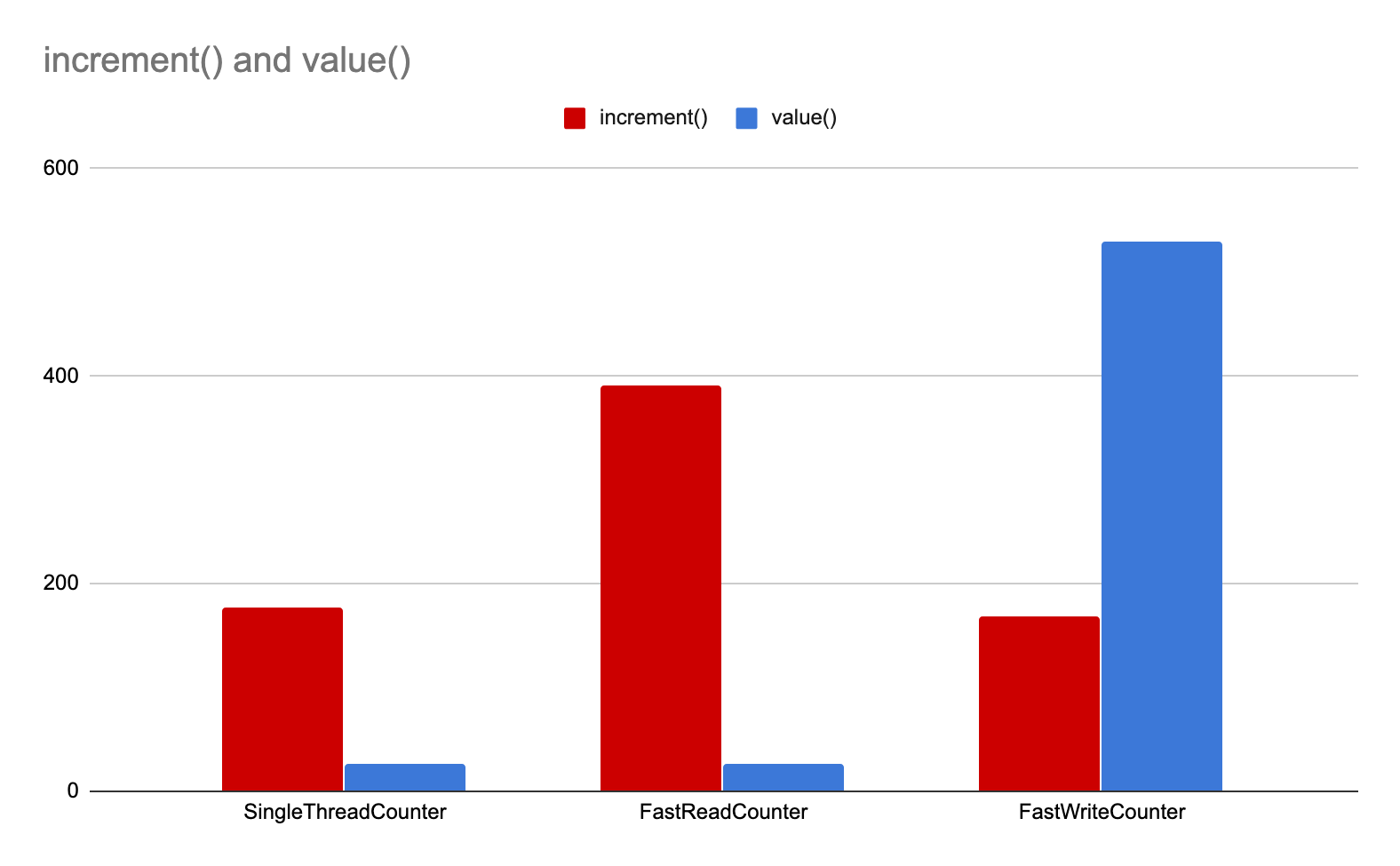本文翻译自Julien Danjou的博客文章

1. 单线程实现
The Straightforward Implementation
在收集日志或者打点的时候,使用计数器是非常常用的情况。常用的简单实现方式,如下所示。
class SingleThreadCounter:
def __init__(self):
self.value = 0
def increment(self):
self.value += 1
In [2]: id = SingleThreadCounter()
In [3]: id.value
Out[3]: 0
In [4]: id.increment()
In [5]: id.value
Out[5]: 1
但是这样会存在一个问题,根据名称我们知道,上述实例是针对单线程而言的。对于单线程的应用程序,这样是可以正常使用的。但是在多线程的时候,则会出现下面这样的情况。由此可知,上述的 Counter 类并不是线程安全的。
Thread-1 reads the value as 23
Thread-1 adds 1 to 23 and get 24
Thread-2 reads the value as 23
Thread-1 stores 24 in value
Thread-2 adds 1 to 23
Thread-2 stores 24 in value
2. 多线程实现
The Thread-Safe Implementation
为了使线程安全,则必须使用锁。每次我们想递增一个数值的时候,都需要判断锁的状态,因此可以保证递增是串行进行的。
import threading
class FastReadCounter:
def __init__(self):
self.value = 0
self._lock = threading.Lock()
def increment(self):
with self._lock:
self.value += 1
此实现是线程安全的,多个线程无法同时递增数值,因此数值不会丢失。但是,该计数器的实现有一个缺点,那就是每次数值需要递增的时候,都需要锁定该计数器。如果有许多线程同时更新计数器的数值,则此时可能会存在锁竞争。虽然优缺点,但是如果用于不经常更新查询的话,那么这个类就是线程安全计数器的绝佳实现。
3. 快速写实现
A Fast Write Implementation
有一种方法可以实现在 Python 中无需在写入时加锁的线程安全的计数器。因为需要使用全局解释器锁,所以此技巧仅在 CPython 上有效。虽然全局解释器锁 GIL 一直被人所诟病,但是这次正是因为 GIL 的存在才能够实现快速写。
当我们执行 C 函数且不执行任何 I/O 操作的时候,该函数不能被任何其他线程所中断,会一直持续运行。事实证明,在 Python 中已经实现了一个类似计数器的类,那就是 itertools.count 类。我们可以使用这个 count 类,来避免在增加计数时使用锁。
如果你阅读过 itertools.count 的文档,你可能会注意到无法读取计数器的当前值。这很棘手,这是我们需要使用锁来绕过此限制。
import itertools
import threading
class FastWriteCounter:
def __init__(self):
self._number_of_read = 0
self._counter = itertools.count()
self._read_lock = threading.Lock()
def increment(self):
next(self._counter)
def value(self):
with self._read_lock:
value = next(self._counter) - self._number_of_read
self._number_of_read += 1
return value
In [12]: counter = FastWriteCounter()
In [13]: counter.value()
Out[13]: 0
In [14]: counter.increment()
In [15]: counter.value()
Out[15]: 1
在这种情况下,加值操作的代码非常简单,计数器只是递增而没有任何锁定。 并发读取的时候使用 GIL 进行访问限制,因此我们不需要锁定任何内容。
另一方面,Python 没有提供任何方法来读取 itertools.count 对象的值,所以我们需要使用一个小技巧来获取当前值。值方法递增计数器,然后获取值,同时减去已读取计数器的次数。因此,此计数器对于写操作是无锁的,但对于阅读而言则是有锁的。
4. 性能对比
虽然我一直认为 timeit 这样的性能测试没有什么意义!
编写完所有的代码之后,我想确定不同的实现方式会对执行速度有多少影响,所以使用 timeit 模块在我的笔记本电脑上进行测试,以下是对该计数器的读写性能。
| OPERATION | SINGLETHREADCOUNTER | FASTREADCOUNTER | FASTWRITECOUNTER |
|---|---|---|---|
increment |
176 ns | 390 ns | 169 ns |
value |
26 ns | 26 ns | 529 ns |

事实证明 SingleThreadCounter 和 FastReadCounter 类具有相同的读取性能。SingleThreadCounter 和 FastWriteCounter 也是一样,它们具有相同的递增性能。这很明显,但是如果你使用的是单线程,则并不需要关心并发访问的问题,你也应该使用简单的递增整数。
5. 完整实现
https://github.com/jd/fastcounter/blob/master/fastcounter/__init__.py
import itertools
import threading
class Counter(object):
"""A counter that is only suitable for application without any concurrency."""
__slots__ = (
"value",
"_step",
)
def __init__(self, init=0, step=1):
self.value = init
self._step = step
def increment(self):
self.value += self._step
class FastReadCounter(Counter):
__slots__ = (
"value",
"_lock",
"_step",
)
def __init__(self, init=0, step=1):
super().__init__(init, step)
self._lock = threading.Lock()
def increment(self):
with self._lock:
self.value += self._step
class FastWriteCounter(Counter):
__slots__ = (
"_number_of_read",
"_counter",
"_lock",
"_step",
)
def __init__(self, init=0, step=1):
self._number_of_read = 0
self._step = step
self._counter = itertools.count(init, step)
self._lock = threading.Lock()
def increment(self):
next(self._counter)
@property
def value(self):
with self._lock:
value = next(self._counter) - self._number_of_read
self._number_of_read += self._step
return value



